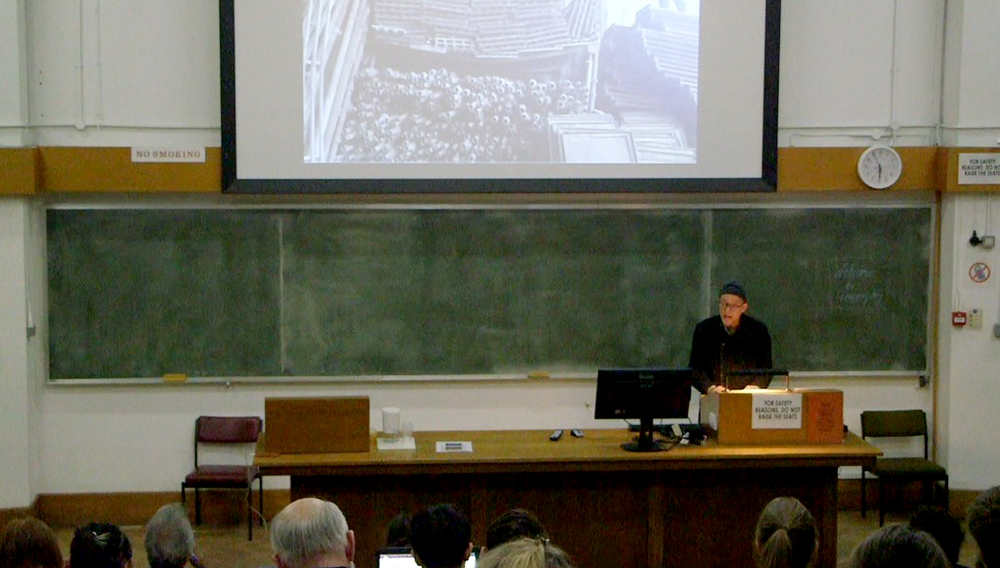AbdouMaliq Simone - 13 November 2017 - On the way home without a world: the case of Delhi
Duration: 1 hour 9 mins
Share this media item:
Embed this media item:
Embed this media item:
About this item

| Description: |
Smuts Memorial Lecture Series 2017
Lecture Three: On the way home without a world: the case of Delhi Speaker: AbdouMaliq Simone (Max Planck Institute for the Study of Religious and Ethnic Diversity) Lecture Three Abstract This lecture explores what it means to live without a world, without an overarching orientation or anchorage that compels bodies, things and places to have something inevitably to do with each other; where the purported coherence undermines itself in the politics of imposing a univocal frame. Here, the very intensity of segregating forces, of expulsions, land-grabs, and gentrification—which indeed are the predominant descriptors of contemporary urban development—also rebound in weird ways, suggesting, even for a moment, not the romance with urban cosmopolitan mixture, but a contingent density of differences that don’t seem to know how to narrate how they all got to be in the same “neighborhood.” Focusing on a series of “strange alliances” in a dense Muslim working class district in Delhi, I attempt to grasp how contexts that provide for both a plurality of small, continuous attainments and prolific blockages are a means of attempting to understand what it means to be at home without a world. |
|---|
| Created: | 2018-01-25 11:11 |
|---|---|
| Collection: | CRASSH |
| Publisher: | University of Cambridge |
| Copyright: | Glenn Jobson |
| Language: | eng (English) |
| Keywords: | AbdouMaliq Simone; SMUTS Memorial Lecture Series; CRASSH; |
| Abstract: | Smuts Memorial Lecture Series 2017
Lecture Three: On the way home without a world: the case of Delhi Speaker: AbdouMaliq Simone (Max Planck Institute for the Study of Religious and Ethnic Diversity) Lecture Three Abstract This lecture explores what it means to live without a world, without an overarching orientation or anchorage that compels bodies, things and places to have something inevitably to do with each other; where the purported coherence undermines itself in the politics of imposing a univocal frame. Here, the very intensity of segregating forces, of expulsions, land-grabs, and gentrification—which indeed are the predominant descriptors of contemporary urban development—also rebound in weird ways, suggesting, even for a moment, not the romance with urban cosmopolitan mixture, but a contingent density of differences that don’t seem to know how to narrate how they all got to be in the same “neighborhood.” Focusing on a series of “strange alliances” in a dense Muslim working class district in Delhi, I attempt to grasp how contexts that provide for both a plurality of small, continuous attainments and prolific blockages are a means of attempting to understand what it means to be at home without a world. |
|---|---|
Available Formats
| Format | Quality | Bitrate | Size | |||
|---|---|---|---|---|---|---|
| MPEG-4 Video | 1280x720 | 2.98 Mbits/sec | 1.51 GB | View | Download | |
| MPEG-4 Video | 640x360 | 1.93 Mbits/sec | .98 GB | View | Download | |
| WebM | 1280x720 | 2.98 Mbits/sec | 1.51 GB | View | Download | |
| WebM | 640x360 | 1.15 Mbits/sec | 595.84 MB | View | Download | |
| iPod Video | 480x270 | 519.79 kbits/sec | 262.69 MB | View | Download | |
| MP3 | 44100 Hz | 250.14 kbits/sec | 126.42 MB | Listen | Download | |
| Auto * | (Allows browser to choose a format it supports) | |||||

